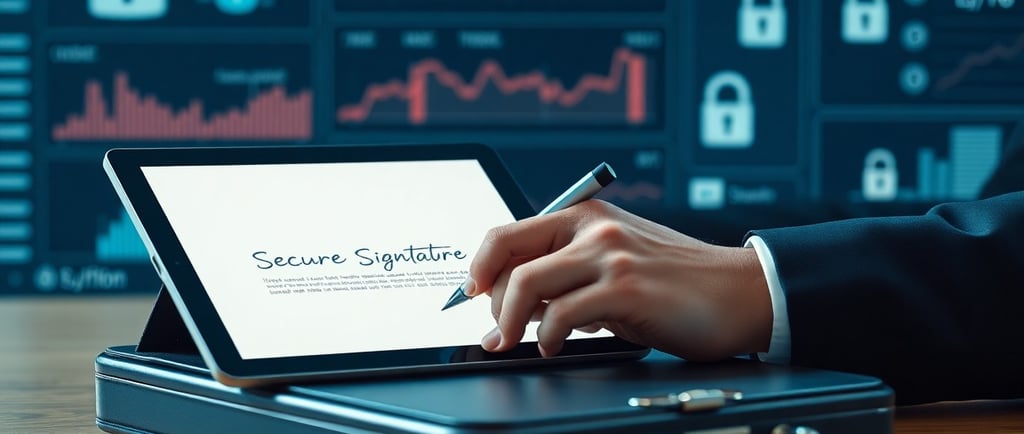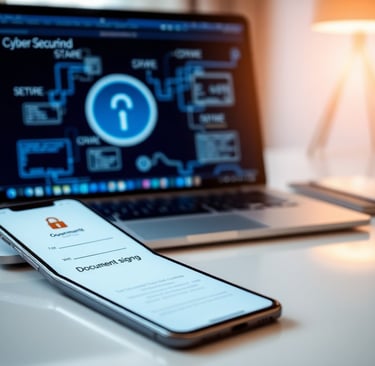Are Mobile Closings Secure? Here's What You Should Know
LOAN SIGNING SERVICES
Frank L Coxx
10/31/20256 min read


Most people are turning to mobile closings for their convenience and efficiency, but you might be wondering about the security of this method. With the increasing risks associated with digital transactions, understanding the protective measures in place for mobile closings is necessary for safeguarding your personal information. This post will explore the security aspects you should consider and provide insights to ensure your mobile closing experience is both safe and secure.
Understanding Mobile Closings
Mobile closings leverage technology to facilitate the home closing process remotely. You can engage in a real estate transaction using devices like smartphones or tablets, allowing for significant flexibility and convenience. For a detailed exploration of this trend, check out A Guide to Closing on a House Remotely - Proof.
What Are Mobile Closings?
Mobile closings involve conducting real estate closing transactions remotely, allowing you to sign documents and finalize deals from your location without needing to be physically present at a closing table.
Benefits of Mobile Closings
Mobile closings offer various advantages, including increased convenience and time savings. You can eliminate travel time, allowing for a quicker and smoother transaction process, which can be especially beneficial if you have a busy schedule.
In addition to saving time, mobile closings enhance flexibility by enabling you to review and sign documents at your own pace, sometimes even outside traditional business hours. You can access critical closing paperwork within the comfort of your home, avoiding last-minute rushes. This approach allows you to coordinate with all necessary parties efficiently, ensuring that the closing process aligns seamlessly with your needs while minimizing stress and potential delays.
Security Concerns
Mobile closings present unique security challenges that require careful consideration. The convenience of conducting transactions via mobile devices can come with vulnerabilities, particularly when it comes to unauthorized access, data breaches, and phishing attacks. Ensuring the security of sensitive information is necessary to maintain trust in mobile closing processes.
Common Security Risks
Cybercriminals often exploit the weaknesses in digital environments. Common risks include unencrypted connections, public Wi-Fi vulnerabilities, and malware that targets mobile applications. These threats can lead to the interception of personal data and financial information during a closing, heightening the need for secure practices.
Protecting Personal Information
Adopting strong security measures is vital for safeguarding your personal information when engaging in mobile closings. Utilize secure networks, keep software updated, and use trusted apps designed for financial transactions. Implementing multi-factor authentication adds another layer of protection against unauthorized access.
To enhance the security of your personal information, you can take additional steps such as regularly monitoring your accounts for unusual activity and employing secure document storage solutions. Enabling automatic updates ensures your device's security features are up-to-date, reducing the risk of vulnerabilities. Familiarize yourself with privacy settings on mobile apps and only share the minimum information necessary during transactions. Being aware of social engineering tactics can also help you recognize suspicious communications that may try to extract sensitive information.
Best Practices for Secure Mobile Closings
Implementing best practices enhances the security of mobile closings. By following guidelines, you can safeguard your sensitive information and ensure a smooth transaction process. Consider exploring the Pros and Cons of Digital Closings for a thorough understanding of potential risks and benefits.
Using Secure Networks
Only utilize trusted and secure networks, such as your home Wi-Fi or a verified VPN, during mobile closings. Public Wi-Fi can expose your transactions to hackers, making your sensitive information vulnerable. Ensuring a secure connection minimizes unauthorized access and enhances overall safety.
Authentication and Verification Methods
Employing multi-factor authentication adds a layer of protection during mobile closings. This method may involve a combination of something you know (a password), something you have (a smartphone for a verification code), and biometric data (like fingerprint recognition). Each layer strengthens security, making unauthorized access increasingly difficult.
Utilizing authentication and verification methods can significantly reduce the risk of fraud during mobile closings. By adopting strategies such as one-time passcodes sent to your phone or email and biometric scans, you create multiple barriers against cyber threats. For example, an individual looking to access your transaction would require not only your password but also your phone access or fingerprint. The integration of these technologies ensures that even if one avenue is compromised, others remain intact, providing peace of mind in the transaction process.
Legal Considerations
As you navigate mobile closings, understanding the legal implications is vital. Various state and federal laws govern electronic transactions, particularly around authentication and documentation. Ensure that your mobile closing service complies with these regulations to avoid any potential legal pitfalls that could jeopardize your transaction.
Compliance and Regulations
Your mobile closing must adhere to specific compliance standards, including the eSign Act and UETA, which validate electronic signatures and documents. Each state may have additional requirements, so verifying your service provider's compliance will protect you and your investment during the closing process.
Understanding Liability
Liability in mobile closings often falls on the parties involved in the transaction, but understanding who is accountable can be complex. A misstep in the closing process can lead to significant financial repercussions, covering issues from identity theft to failed transactions.
In many cases, title companies and closing agents take on liability for their errors, but technology providers may also bear some responsibility, especially should a security breach occur. By reviewing your mobile closing service’s terms and liability coverage, you can better assess your risk exposure and ensure appropriate protection against potential mishaps. Choosing vendors with robust cybersecurity measures and clear liability policies is necessary to safeguard your interests. Understanding the intricacies of liability will empower you to engage more confidently in mobile transactions and choose reputable service providers.
The Role of Technology
Technology underpins the efficiency and security of mobile closings, enhancing the entire transaction process. The use of sophisticated tools enables seamless communication between parties, reduces delays, and facilitates a streamlined signing experience. With advancements in mobile applications and cloud storage, managing documents and accessing necessary information has never been easier for you during a closing.
Encryption and Data Protection
Encryption plays a pivotal role in safeguarding your sensitive information during mobile closings. Leading platforms utilize advanced encryption standards, securing data both in transit and at rest. This process transforms your documents into unreadable code, ensuring that only authorized parties can access them, thus significantly reducing the risk of unauthorized breaches.
E-signature Security
E-signatures offer a convenient yet secure way to finalize documents in mobile closings. Most platforms comply with legal standards like the ESIGN Act and UETA, validating e-signatures as legally binding. Encryption and authentication methods, such as two-factor authentication, further bolster e-signature security, granting you confidence that your identity and consent are protected throughout the closing process.
E-signature security includes various verification measures, ensuring that each signature is legitimate and aligned with the signer's identity. Many providers implement biometric recognition or SMS verification to guarantee that the individual signing the document is indeed you. Additionally, an audit trail is often created, logging every action taken during the signing process. This not only deters fraud but also provides a transparent record should you need to reference any part of the transaction in the future.
Case Studies
Case Study 1: A California-based lender implemented mobile closings, achieving a 30% reduction in closing times while maintaining a 98% customer satisfaction rate.
Case Study 2: A Texas real estate agency reported a 25% increase in transaction volume after adopting mobile closing technology, citing improved client convenience as a key factor.
Case Study 3: In Florida, a title company noted a 40% decrease in document errors through streamlined mobile processes, leading to a 15% increase in repeat business.
Case Study 4: A New York bank successfully integrated mobile closings, resulting in a 50% decrease in operational costs associated with traditional closings.
Successful Mobile Closing Examples
Your peers have experienced significant success by leveraging mobile closing technologies. Case studies highlight substantial improvements in efficiency and customer satisfaction, with some organizations reporting up to a 30% reduction in closing times and a remarkable 98% satisfaction rate from clients. Such results demonstrate how adopting mobile options can enhance productivity and client relationships.
Lessons from Security Breaches
Incidents of security breaches in mobile closings reveal critical vulnerabilities that organizations must address. Data from recent reports indicates that 65% of fraud-related incidents stem from inadequate security measures. Investigating these breaches shows that many could have been prevented through stronger authentication protocols and enhanced encryption practices.
The analysis of security breaches emphasizes the importance of robust safeguards in mobile closing environments. Notable incidents illustrate how inadequate password protection and unencrypted data transfers allowed unauthorized access to sensitive information, resulting in significant financial losses for involved parties. Implementing multifactor authentication and end-to-end encryption could mitigate these risks and bolster consumer trust in mobile transactions.
Summing up
Considering all points, it's clear that while mobile closings offer convenience, you must be vigilant about security measures. Ensure that your devices are updated, use strong passwords, and employ two-factor authentication to protect your sensitive information. Engaging with reputable service providers who prioritize security will further enhance your experience. By staying informed and proactive, you can navigate mobile closings with confidence and safeguard your personal data effectively.






